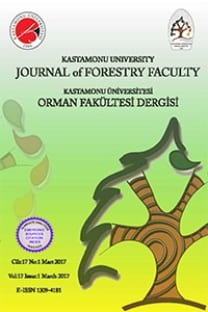Türkiye Florası İçin Yeni Bir Kayıt: Cerastium szowitsii Boiss. (Caryophyllaceae)
Çalışmanın amacı: Bu çalışmada, Türkiye'nin vasküler bitki türlerinin çeşitliliğine katkıda bulunulması amaçlanmıştır.
Çalışma alanı: A8 Artvin: Hatila Vadisi Milli Parkı, kayalık alanlar, yol kenarı, Kuzeydoğu Anadolu’da 559 m.
Materyal ve yöntem: 2011 ve 2012 yıllarında yapılan arazi çalışmaları sırasında toplanan çok sayıda bitki materyalleri standart herbaryum tekniklerine göre hazırlanmış ve üç ayrı herbaryuma yerleştirilmiştir.
Temel sonuçlar: Cerastium szowitsii Boiss. Türkiye florası için yeni bir tür olarak rapor edilmektedir.
Araştırma vurguları: Damarlı bitkiler üzerine yapılan son çalışmalar, Türkiye’de doğal ve egzotik yeni bitki kayıtlarının yapıldığını ortaya koymaktadır. Bundan dolayı bu tür çalışmaların Kuzeydoğu Anadolu’nun dağlık kesimlerinde yapılmalıdır.
Anahtar Kelimeler:
Anadolu, Artvin, Caryophyllaceae, Cerastium, Yeni Kayıt
A New Record for the Flora of Turkey: Cerastium szowitsii Boiss. (Caryophyllaceae)
Aim of study: In this study, it was aimed to contribute the vascular plant species diversity of Turkey.
Area of study: A8 Artvin: Hatila Valley National Park, rocky places, roadsides, 559 m in NE Anatolia.
Material and method: Plant materials were collected during the field studies in the years 2011 and 2012. They were processed according to standard herbarium techniques and stored at three herbariums.
Main results: Cerastium szowitsii Boiss. is reported as a new species to the Turkish flora.
Research highlights: Recent studies on vascular flora underlined that native and non-native taxa have been newly recorded from Turkey. Thus, this kind of studies should be conducted in mountainous part of NE Anatolia.
Keywords:
Anatolia, Artvin, Caryophyllaceae, Cerastium, New Record,
___
- Ayaşlıgil, Y. (1984). New taxa and records from S.W. Turkey. Notes R.B.G. Edinburgh, 42, 69-76.
- Bittrich, V. (1993). Caryophyllaceae. K. Kubitzki et al. (eds.) The families and genera of vascular plants. Berlin: Springer-Verlag, 2, 206- 236.
- Boissier, E. (1867). Cerastium L. Boissier, E., (Ed.), Flora Orientalis. Basel: apud H. Georg,. 1, 712-730.
- Cullen, J. (1967). Cerastium L. Davis, P.H., (Ed.), Flora of Turkey and the East Aegean Islands. Edinburgh: Edinburgh University Press, 2, 73-85.
- Davis, P.H.& Mill, R (1988). Cerastium L. Davis, P.H., (Ed.), Flora of Turkey and the East Aegean Islands, Edinburgh: Edinburgh University Press, 10., 69-71.
- Güner, A. & Ekim, T. (Edit.). (2014). Resimli Türkiye Florası, cilt 1. İstanbul: NGBB Yayınları Flora Dizisi 2, Flora Araştırmaları Derneği ve Türkiye İş Bankası Kültür Yayınları.
- Güner, A., Özhatay, N., Ekim, T. & Başer, K.H.C. (2000). Flora of Turkey and the East Aegean Islands, Edinburgh: Edinburgh University Press, 11. IPNI. (2019). http://www.ipni.org/, Accessed: 25.06.2019.
- Karaer, F. & Terzioğlu, S. (2014). A new alien record for the flora of Turkey: Sigesbeckia pubescens (Compositae). Turkish Journal of Botany, 37(1), 188-190.
- Karyagin, I.I. (Ed.). (1950-1961). Flora of Azerbaijan. Vols. 1-8. Baku, Azerbaijan: Publishing House of Acad. Sci. Azer. SSR.
- Keskin, M. (2012). Cerastium L. Güner A., Aslan S., Ekim, T., Vural, M., Babaç, M.T. (Eds.), Türkiye Bitkileri Listesi (Damarlı Bitkiler). İstanbul, Turkey: Flora Araştırmaları Derneği.
- Keskin, M. (2018). Notes on Cerastium brachypetalum Pers. (Caryophyllaceae) and new subspecies records for Turkish flora. Bağbahçe Bilim Dergisi, 5 (2), 17-24.
- Komarov, V.L. (1970). Flora of USSR. Israel Program for Scientific Translations Jerusalem: The Smithsonian Institution, U. S.A. and The National Science Foundation, Washington, D.C.
- Miceli, P., Bechi, N. & Barberis, G. (1997). Biosystematic investigation on perennial Cerastium L. (Caryophyllaceae) populations from Tuscany (NW Italy). Lagascalia, 19(1-2), 819-830.
- Móschl, W. (1966). De Cerastiis florae Iranicae. vorarbeiten zur flora Iranica. 24 Sitzungber. Oesterr. Akad. Wiss. Math. - Natw. Abt. 1, 175(7/8), 159- 217.
- Poursakhi, K., Assadi, M., Ghahremaninejad, F., Nejadsattari, T. & Mehregan, I. (2013). A new subspecies of the genus Cerastium L. (Caryophyllaceae) from Iran. Iran Journal of Botany, 19(1), 47-53.
- Rabeler, R.K. & Hartman, R.L. (2005). Caryophyllaceae. Flora of North America, North of Mexico, New York: Oxford University Press, 5, 3-8.
- Scheen, A.C., Brochmann, C., Brysting, A.K., Elven, R., Morris, A., Soltis, D.E., Soltis, P.S. & Albert, V.A. (2004). Northern hemisphere biogeography of Cerastium (Caryophyllaceae) insights from phylogenetic analysis of noncoding plastid nucleotide sequences. American Journal of Botany, 91, 943-952.
- Sell, P.D. & Whitehead, F.H. (1993). Cerastium L. Tutin, T.G., et al. (Eds.). Flora Europaea .Cambridge: Cambridge University Press, 1 (second ed.), 164-175.
- Sokolova, I. (1996). Conspectum generis Cerastium L. (Caryophyllaceae) florae Caucasi. Novosti Sysytematiki Vysshikh Rasteniy, 30, 33-47.
- Takhtajan, A. L. (Ed.). (1954-2001). Flora of Armenii. Yerevan: Armenian Academy of Sciences Press, 1, 11.
- Terzioğlu, S. & Anşin, R. (2001). A chorogical study on the taxa naturalized in the eastern Black sea region. Turkish Journal of Agriculture and Forestry, 25, 305-309.
- Terzioğlu, S. & Karaer, F. (2014). An alien species new to the flora of Turkey: Lysimachia japonica Thunb. (Primulaceae). Turkish Journal of Botany, 33(2), 123-126.
- Tolmachev, A.I. (1970). Cerastium L. Komarov, V.L., (Ed.). Flora of the USSR. Israel Program for Scientific Translations. Jerusalem (Translated from Russian). The Smithsonian Institution, U. S.A. and The National Science Foundation, Washington, D.C., 6, 330-358.
- ISSN: 1303-2399
- Yayın Aralığı: Yılda 3 Sayı
- Başlangıç: 2001
- Yayıncı: Kastamonu Üniversitesi
Sayıdaki Diğer Makaleler
İnterseks Çiçekli Salix caprea L. (Salicaceae)’nın Kuzeydoğu Anadolu’da Varlığı
Salih TERZİOĞLU, Bedri SERDAR, Kamil COŞKUNÇELEBİ, Murat ÖZTÜRK
Sugi Diri ve Öz Odununda Bor, Flor ve Bakır Dağılımı: Elementler Arasındaki Etkileşimler
SAİP NAMİ KARTAL, Evren TERZİ, Tsuyoshi YOSHIMURA
BÜLENT SAĞLAM, Ayla BİLGİN, Mustafa AYBAR
Trichoptera Larvalarının Araç Çayı’nda (Kastamonu, Karabük, Türkiye) Mevsimsel ve Mekânsal Dağılımı
İbrahim KÜÇÜKBASMACI, Özlem FINDIK
Türkiye Orman Ürünleri Endüstrisinde Bilgi ve İletişim Teknolojileri Kullanımı: Bir Vaka Çalışması
Assmaa ALAOUI, Said LAARIBYA, Sezgin AYAN
Türkiye Florası İçin Yeni Bir Kayıt: Cerastium szowitsii Boiss. (Caryophyllaceae)
